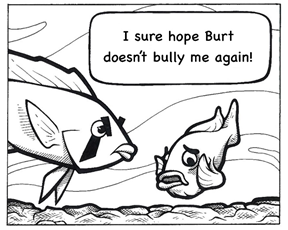Extreme maternal care
So here’s the dilemma: how does our brain and body control these switches in motivation between feeding and maternal care? One minute we’re eating, and the next minute after we spawn and the eggs are in our mouth, we stop feeding, cold turkey, and need to start caring for the eggs by churning them around so they grow big and strong! To examine this question, the researchers are looking at which regions of our brain are ‘turned on’ or ‘activated’ in groups of us ladies that are either brooding, or starved or fed for ~ 2 weeks; the same time as a normal brood cycle. By comparing these groups, they can discover which brain regions might be involved in metabolism and feeding, versus those regions involved in our maternal care behaviors. By doing some staining experiments called double-labeling (see picture), they’re also looking at exactly what kind of neurons in the brain are turned on – this gives them insights on their function! So far, they are unveiling some very interesting differences in brain activation patterns likely due to the starvation aspect of brooding compared to the maternal care aspect; stay tuned for more specific results in the future! Since maternal care happens in lots of different animals, the researchers are interested in understanding how similar or different the brain mechanisms that help control these parental behaviors are, between, say, a fish like me, a frog, a bird, and a mammal. We love it when the scientists use us to discover new things that can be applied to other animals!
The nice folks at the National Science Foundation gave us some support to study some of these questions related to mouth brooding and maternal care. If you think about it, this research has important relevance to many other animals, including humans! As fish, we are vertebrates (animals with backbones), as are amphibians, reptiles, birds, and mammals, and we all have very similar brain structures. If the scientists can better understand how the brain controls the conflicting motivations of feeding and maternal care in us fish, it could lead to insights into eating and metabolic disorders even in people!





Comments
Post a Comment